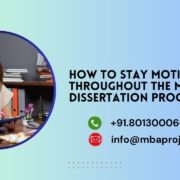How to Stay Motivated Throughout the MBA Dissertation Process
How to Stay Motivated Throughout the MBA Dissertation Process
Understanding the Challenges of an MBA Dissertation
How to Stay Motivated Throughout the MBA Dissertation Process. The MBA dissertation process is one of the most challenging yet rewarding aspects of business education. It requires dedication, research skills, and strategic time management to produce a high-quality dissertation that contributes valuable insights to the business world. However, maintaining motivation throughout this demanding journey can be tough. Here, we explore effective strategies to stay focused, energized, and productive from start to finish.
Setting Clear Goals and Milestones
One of the most effective ways to stay motivated is by setting clear and achievable goals. Breaking down the dissertation process into manageable phases will help avoid feeling overwhelmed. Here’s how:
- Define Your Research Objectives: Clearly outline what you want to achieve with your dissertation.
- Break It Into Phases: Divide the dissertation into research, data collection, writing, and revision.
- Set SMART Goals: Ensure your goals are Specific, Measurable, Achievable, Relevant, and Time-bound.
- Use a Timeline: Set weekly or monthly milestones to track your progress.
By following this structured approach, you maintain a sense of direction and accomplishment throughout the process.
Developing a Strong Research Plan
A well-planned research strategy ensures that you stay on track and avoid unnecessary delays. Consider these steps:
- Choose a Topic You Are Passionate About: Interest in your topic keeps motivation levels high.
- Conduct Extensive Literature Review: Identify gaps in existing research to position your study effectively.
- Utilize Multiple Sources: Use academic journals, industry reports, and expert interviews to strengthen your research.
- Create an Organized Database: Use tools like Zotero or Mendeley to manage references efficiently.
A strong research foundation will make the writing phase smoother and more engaging.
Building a Productive Routine
Consistency is key to successfully completing your dissertation. Establishing a daily or weekly routine helps maintain focus. Here’s how you can create an efficient routine:
- Designate a Work Space: Have a dedicated and distraction-free environment for writing.
- Follow a Writing Schedule: Allocate specific time slots for research, writing, and editing.
- Use Productivity Techniques: Implement methods like the Pomodoro Technique (25-minute work intervals) or time blocking to stay focused.
- Track Your Progress: Maintain a dissertation journal or use tracking apps like Trello or Notion to monitor your achievements.
With a well-structured routine, staying motivated becomes easier as you see continuous progress.
Overcoming Writer’s Block
At some point, every MBA student encounters writer’s block, leading to frustration and loss of motivation. Here are ways to overcome it:
- Free Writing: Start writing without worrying about perfection. Editing comes later.
- Change Your Environment: A new workspace or background music can stimulate creativity.
- Discuss Ideas: Talking to peers or professors often helps generate fresh perspectives.
- Take Breaks: Short breaks help refresh your mind and boost productivity.
By tackling writer’s block proactively, you ensure continuous progress on your dissertation.
Utilizing Support Systems
A strong support network can be a game-changer when motivation dips. Here’s how you can leverage your support system:
- Academic Advisors: Regular check-ins with advisors keep you accountable and provide valuable feedback.
- Study Groups: Engaging with fellow MBA students fosters motivation and collaborative learning.
- Family and Friends: Their encouragement and understanding help reduce stress.
- Online Communities: Platforms like ResearchGate, LinkedIn, or university forums offer peer support and insights.
Seeking support ensures that you remain mentally and emotionally balanced throughout the process.
Maintaining Work-Life Balance
The MBA dissertation process can be overwhelming, leading to burnout. Maintaining a balance between study and personal life is crucial. Consider these strategies:
- Prioritize Self-Care: Exercise, meditation, and hobbies help refresh your mind.
- Avoid Overworking: Take regular breaks to prevent exhaustion.
- Set Boundaries: Communicate with family and colleagues about your study commitments.
- Reward Yourself: Celebrate small wins to stay motivated.
A healthy work-life balance improves focus and productivity, making dissertation writing more enjoyable.
Using Technology and Tools for Efficiency
Several digital tools can enhance your efficiency and keep you motivated throughout the dissertation journey:
- Writing Tools: Scrivener, Grammarly, Hemingway Editor for structured and error-free writing.
- Reference Managers: EndNote, Mendeley, Zotero to organize citations.
- Project Management Apps: Notion, Trello, Asana for task tracking and deadline management.
- Time Management Tools: Forest App, Pomodone, RescueTime for focus and productivity.
Incorporating these tools minimizes stress and ensures seamless progress.
Seeking Professional Help When Needed
If you find yourself struggling despite your best efforts, seeking professional assistance can be beneficial:
- Dissertation Writing Services: Professional editors and writers provide valuable feedback.
- University Resources: Libraries, writing centers, and research workshops are invaluable.
- Mentors and Professors: Their guidance can clarify doubts and provide direction.
Investing in professional help ensures quality research and a well-structured dissertation.
Final Thoughts: Staying Motivated Until Submission
The MBA dissertation process is a long and demanding journey, but staying motivated is entirely possible with the right strategies. By setting clear goals, maintaining a structured routine, leveraging support systems, and using productivity tools, you can stay on track and successfully complete your dissertation.
Remember, persistence and consistency are key. Stay focused, celebrate small victories, and embrace the learning process.
Thank you for reading our Blog “How to Stay Motivated Throughout the MBA Dissertation Process”.
Also, read our more BLOG here.
For Order “MBA Projects” feel free to contact us at Mob: Call / WhatsApp: +91.8013000664 || Email: info@mbaprojects.net.in










